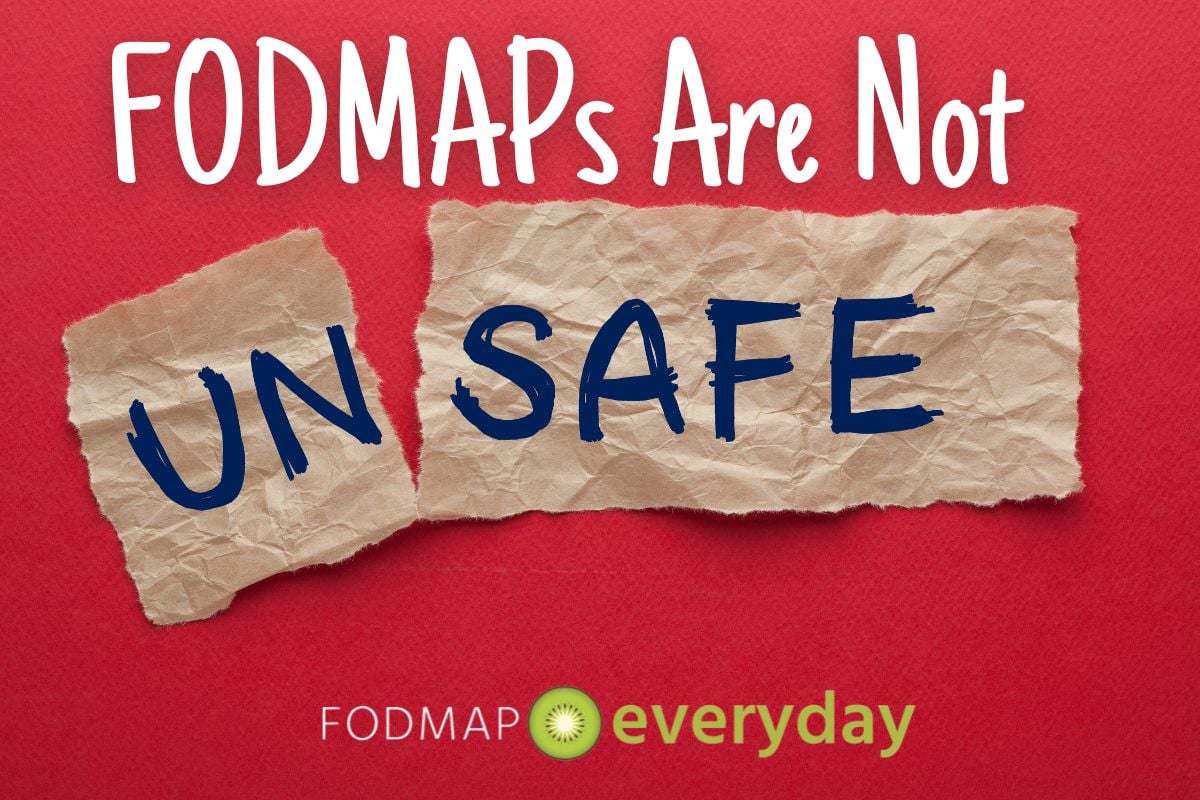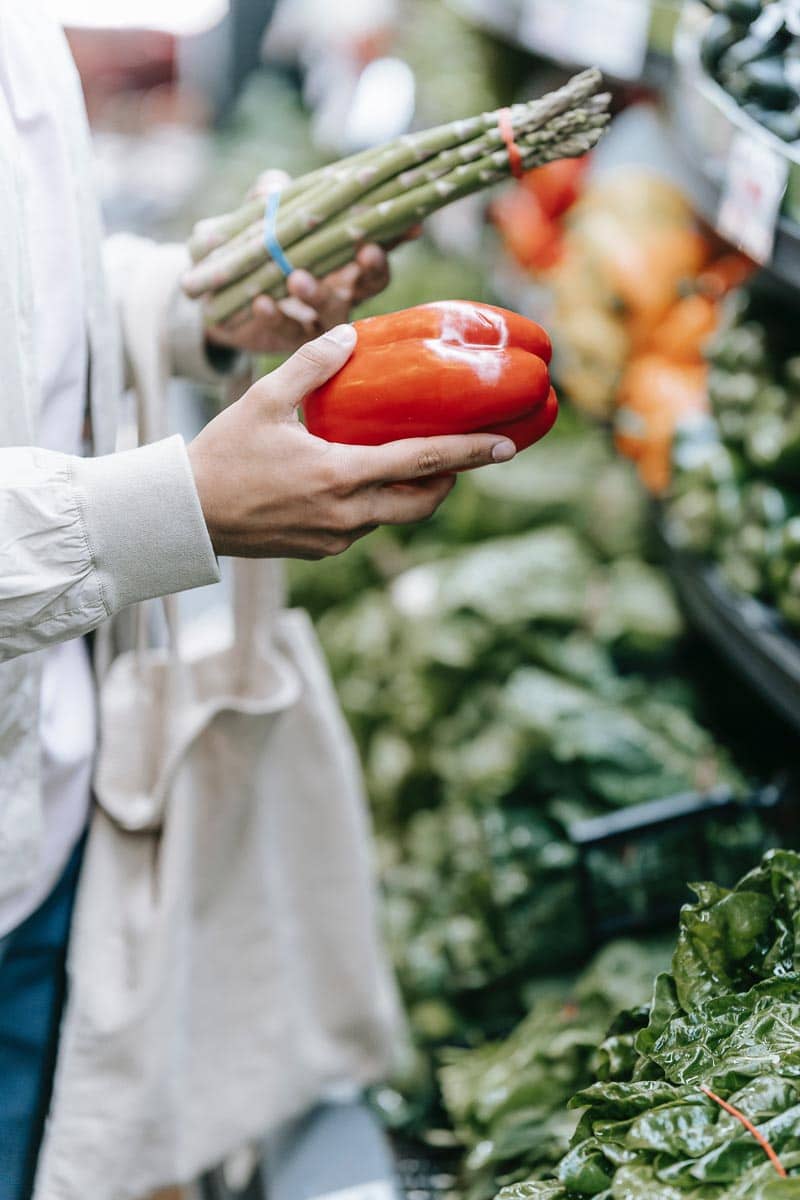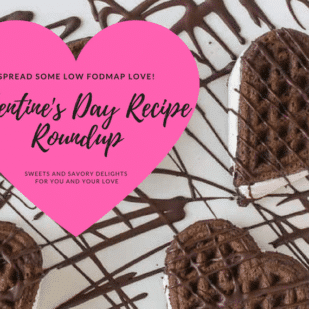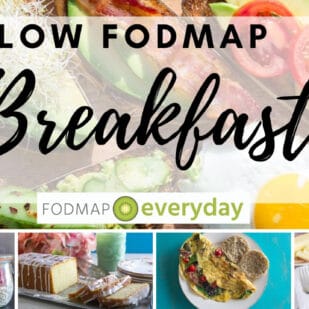Perhaps you have seen people asking if a food is “safe”, ostensibly from a FODMAP perspective? We see this all the time, particularly in Facebook groups, where someone posts a product, maybe with an ingredient label, and asks, “is this safe”?
Good news! FODMAPs are not unsafe.

Words Can Create A Negative Relationship With Food
As the years have progressed, I have come to make changes in my language when discussing the low FODMAP diet. We no longer use “safe” or “unsafe” terminology in our Facebook Groups or on our site, FODMAP Everyday®, because these words demonize food in a way that our team does not find helpful. In fact, we find it to be detrimental.
We no longer use “safe” or “unsafe” terminology in our Facebook Groups or on our site, FODMAP Everyday®, because these words demonize food in a way that our team does not find helpful. In fact, we find it to be detrimental.
Saying “Safe” Would Mean There Is “Unsafe”
Of course, there are unsafe foods. “Unsafe” is food that is contaminated by E. coli, botulism, listeria or salmonella, as examples. High FODMAP food is not “unsafe”; it is just high FODMAP. If you have a true food allergy, then there are unsafe foods for you e.g., peanut allergy means peanuts are unsafe for you! But that is outside of the FODMAP arena.

FODMAPs Are Not Unsafe – They Are Just Higher In FODMAPs
In addition to refraining from using “safe” and “unsafe” words in our FODMAP Everyday® world, our main point is to get you to think about your food in a different way. An apple is not unsafe. A large portion of ice cream is not unsafe – these examples are just higher in FODMAPs than perhaps you can tolerate at this point in time, or what might be posted as a low FODMAP serving size on the Monash University smartphone app.

Months down the line you might reintroduce a food that triggered your irritable bowel syndrome (IBS) previously – and find out that you can now tolerate it. It was never “unsafe”; it was just too high in FODMAPs for you at one point in time.
High FODMAP food is not “unsafe”; it is just high FODMAP.
Your Relationship With FODMAPs Is Unique
This last point, of how you react to foods, is a major one. What we all want to know is if a food is going to trigger IBS symptoms in ourselves. This is not the same question as asking if something is lab tested and determined to be low FODMAP or high FODMAP. For more on this please read our article, Ask The Right Question: Is This Low FODMAP vs. Can I Tolerate This?
Think about it…what we all want to know is whether a food is going to trigger symptoms for us. It doesn’t matter what the lab reports say. We suggest thinking of the lab reported low FODMAP serving sizes as lines in the sand from where to begin your exploration with FODMAPs.
And always remember what you do not tolerate today you might very well tolerate later on. Safe or unsafe? Nope! Just low or high FODMAP and finding the right amounts (or not) of foods that work for you through a structured approach to the low FODMAP diet is the point and goal of the diet. And ultimately to eat as broadly as possible without triggering your IBS symptoms.

Determining Your Triggers
The most direct route to determining your tolerances is to work with a Registered Dietitian. Statistically, and anecdotally, you have a greater chance of success if you work with a RD, and now, more than ever, they are more accessible than ever as they will often work remotely, via telehealth visits.
These articles will help you further:
- Have IBS? Top Reasons To Work With A Dietitian
- Dietitians & Nutritionists: What’s The Difference?
- Patient Dos and Don’ts For a Great Telehealth Appointment
- High FODMAP Foods With Low FODMAP Serving Sizes
- What Is A Low FODMAP Serving Size?
The Takeaway
Our goal at FODMAP Everyday® is to help you all learn to thrive on the low FODMAP diet, and we find that using positive language is a great step! The low FODMAP diet, and working with a RD, will very likely help you find relief with your IBS.
PS: We are thrilled that our fellow respected FODMAP educators like Joanna Baker APD and Alana Scott from A Little Bit Yummy have written about this as well. Let’s change the dialogue one person at a time! Spread the word about words!








Thank you for posting this. After I started working with FODMAPs, some of my symptoms improved but I also slowly developed disordered or unhelpful thoughts about food or food anxiety. Terms like “safe” and “unsafe,” and “good vs. bad,” and even “Is this okay for low FODMAP?” contributed and sometimes continue to trigger me. It was to the point that I began to avoid websites like this, as much as I enjoy reading about new recipes and research. I learned about the high incidence of eating disorders or subclinical eating disorders among people with GI conditions and that my case is not unusual, even if it sometimes feels that way. I’m glad you brought up the importance of language. Thank you.
Em, this means so much to us. You have echoed our sentiments exactly. Many have admonished us, seemingly for being too picky or literal, I guess. But we know how important words are and we are so happy you feel like you are respected in our community.
Interesting that today’s article talks about moving away from labelling food safe or unsafe in relation to fodmaps and then after I read the article there is a promo for a wallet card for safer ordering food in restaurants. Seems like that promo might be best reworded.
Oh my! You are so right. The card was developed about five years ago and we have evolved in our approach. Thank you very much for pointing this out and I will take care of it
I have corrected one place that we could see the “safe” word, but am wondering if it was a pop-up ad, which was not ours? We have little control over that. If you could offer more specifics, I will make sure to attend to anything else you point out.